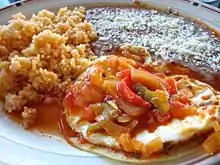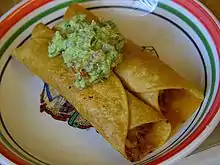 Carne al pastor (al pastor meat) on a trompo | |
| Course | Main course |
|---|---|
| Place of origin | Mexico |
| Region or state | Mexico City |
| Associated cuisine | Mexican |
| Created by | Lebanese Mexicans |
| Serving temperature | Warm |
| Main ingredients | Marinated pork meat |
| Ingredients generally used | |
| Variations | Gringas |
Al pastor (from Spanish, "shepherd style"), tacos al pastor, or tacos de trompo is a preparation of spit-grilled slices of pork originating in the Central Mexican region of Puebla and Mexico City, although today it is a common menu item found in taquerías throughout Mexico. The method of preparing and cooking al pastor is based on the lamb shawarma brought by Lebanese immigrants to the region.[1][2][3] Al pastor features a flavor palate that uses traditional Mexican adobada (marinade). It is a popular street food that has spread to the United States. In some places of northern Mexico and coastal Mexico, such as in Baja California, taco al pastor is known as taco de trompo or taco de adobada.
A variety of the dish uses a combination of Middle Eastern spices and indigenous central Mexican ingredients and is called tacos árabes.[4]
History
During the 19th century, variations of a vertically grilled meat dish, now known by several names, started to spread throughout the Ottoman Empire. The Lebanese version, shawarma, was brought to Mexico in the late 19th and early 20th centuries by a wave of Lebanese immigrants, mainly Christians such as the Maronites who have no religious dietary restrictions on eating pork.[5]
In the 1920s in the state of Puebla, lamb meat was replaced by pork. Mexican-born progeny of Lebanese immigrants began opening their various restaurants. Later, in Mexico City, they began to marinate with adobo, and using corn tortillas, which resulted in the al pastor taco. It is unknown when they began to be prepared as we know it today, however, some agree that it was in the 1960s when they became popular.[6]
Preparation
Pork is marinated in a combination of dried chilies, spices, pineapple, and typically achiote paste, then slowly cooked with charcoal or gas flame on a vertical rotisserie called a trompo (lit. 'spinning top'), the meat is shaved off as the outside is browned, and made into tacos. Guajillo chile, garlic, cumin, clove, bay leaf, and vinegar are common ingredients, with cinnamon, dried Mexican oregano, coriander, and black peppercorns found in many variants.[7] Meat is thinly sliced off the spit with a large knife into a small corn tortilla and served with finely chopped onions, cilantro, and diced pineapple. A wedge of lemon or lime and a salsa are optional condiments. This meat is also a common ingredient in gringas, alambres, huaraches, tortas, burritos, and pizza.[5]
Varieties

In some places of northern Mexico, such as Nuevo León, Durango and Chihuahua, these are usually called tacos de trompo if served on corn tortillas, and gringas if they are served with cheese on flour tortillas.
A similar dish is called tacos árabes (lit. 'Arabic tacos'), which originated in Puebla in the 1930s from Arab-Mexican cuisine. Tacos árabes use shawarma-style meat carved from a spit, but are served in a pita-style bread called pan árabe (lit. 'Arabic bread'). These tacos have been brought by Mexican immigrants to the United States in the past few years and have become popular in cities such as Chicago and Los Angeles, two of the largest Mexican/Mexican-American population centers in the United States.[8]
A chicken version marinated in the al pastor style was brought back to the Middle East in the early 2000s, and sold as "shawarma mexici". It is typically served in the Middle Eastern style, wrapped with garlic mayonnaise, dill pickle, and french fries in a thin flatbread.
See also
References
- ↑ Watson, Katy (2 September 2015). "Sharwarma: Taco al pastor's culinary ancestor". BBC. Retrieved 4 August 2022.
- ↑ Sterling, David (2014). Yucatán: Recipes from a Culinary Expedition. pp. 333, 358–363. ISBN 978-0292735811.
- ↑ Sterling, David (26 April 2016). "The Lebanese Connection, Yucatan: A Culinary Expedition". Archived from the original on 26 April 2016. Retrieved 12 July 2022.
- ↑ Peterson, Lucas (26 March 2015). "These Massive Tacos Árabes in Boyle Heights Pack a Punch". Eater.com LA. Retrieved 10 March 2018.
- 1 2 "Sharwarma: Taco al pastor's culinary ancestor". BBC News. 2015-09-02. Retrieved 2023-02-02.
- ↑ Prichep, Deena; Estrin, Daniel. "Thank the Ottoman Empire for the taco al pastor". TheWorld.org. Retrieved 12 July 2022.
- ↑ Hursh Graber, Karen (2006). "Wrap It Up: A Guide to Mexican Street Tacos Part II: Nighttime Tacos". mexconnect.com. Archived from the original on 2009-05-29. Retrieved 29 January 2022.
- ↑ Hammond, David (8 November 2007). "Perfection on a Spit". chicagoreader.com. Archived from the original on 10 November 2007. Retrieved 4 August 2022.




.jpg.webp)




_01.JPG.webp)
